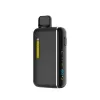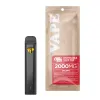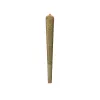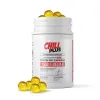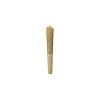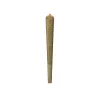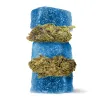Cannabis is a complex plant that contains an array of compounds, including cannabinoids, terpenes, and flavonoids. These compounds interact with the body's endocannabinoid system (ECS), influencing various physiological functions.
Among cannabinoids, THC (tetrahydrocannabinol) and CBD (cannabidiol) are the most well-known, but the plant boasts numerous other cannabinoids, each with distinct effects and roles in the body.
THCA, or tetrahydrocannabinolic acid, is a non-intoxicating cannabinoid found abundantly in raw cannabis. Unlike THC, THCA doesn't produce psychoactive effects in its natural state.
It holds potential therapeutic properties and exists prominently in freshly harvested cannabis, alongside an assortment of other cannabinoids and terpenes. THCA transforms into THC through decarboxylation, triggered by heat application or combustion.
What is THCA?
THCA (tetrahydrocannabinolic acid) is a precursor to THC found in raw cannabis. In its raw, natural state, THCA doesn't induce the typical psychoactive effects associated with THC. It's abundant in freshly harvested cannabis and is considered the carboxylated form of THC, containing an additional carboxylic acid group.
THCA's chemical structure includes a carboxylic acid group (COOH), which distinguishes it from THC. This carboxylic acid group gives THCA its acidic nature, making it biochemically different from THC.
THCA undergoes decarboxylation when exposed to heat, converting into THC. It's this decarboxylation process that causes the transition from non-intoxicating THCA to the psychoactive THC.
In comparison to other cannabinoids like CBD or THC, THCA products stand out due to their potential to be both, psychoactive and non-psychoactive depending on how they’re consumed.
Known for its potential medicinal properties, which are currently being examined by researchers, when in its raw, non-psychoactive form, THCA holds promise as the best of both worlds when it comes to cannabinoids.
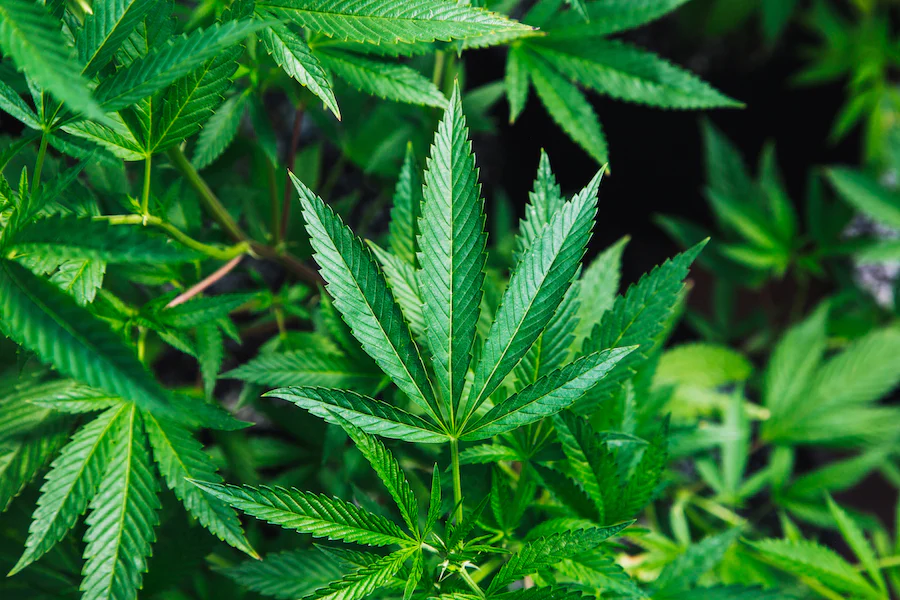
THCA vs THC
THCA and THC share similar structures but differ due to a carboxylic acid group present in THCA. This carboxylic acid group is removed through decarboxylation, resulting in THC.
The structural distinction influences their respective biological activities. While THCA is non-psychoactive, THC is psychoactive, binding to cannabinoid receptors in the brain.
Some key differences between THCA and THC:
-
THCA and THC possess similar structures, with THCA containing a carboxylic acid group, which THC lacks after decarboxylation.
-
THCA is non-psychoactive, not producing the euphoric high associated with THC, while THC is psychoactive, binding to brain receptors to induce altered perception and relaxation.
-
THCA becomes THC through decarboxylation, a process often initiated by heat, such as smoking or vaping cannabis.
-
THC has a high binding affinity to cannabinoid receptors in the brain and body, leading to its psychoactive effects, whereas THCA does not bind as strongly to these receptors.
-
THCA is found in raw, unheated cannabis, while THC is more prevalent in heated or aged cannabis due to the decarboxylation process.
THCA does not induce the euphoric high typically associated with THC. It is considered non-intoxicating in its raw form and lacks the psychoactive effects linked to THC consumption.
THC, on the other hand, binds to the cannabinoid receptors in the brain and body, producing psychoactive effects, including altered perception, relaxation, and euphoria. This fundamental difference in effects stems from the structural variation between THCA and THC.
In essence, THCA becomes THC when heated, but before undergoing that transformation, THCA holds much potential in a non-psychoactive way, meaning you as a user get to pick your own adventure with this incredible compound!
THCA vs. Delta 8
Now that you better understand the difference between THCA and THC, it’s time to get into the technicalities that separate delta 8 products from THCA.
You already know that THCA transforms into THC upon decarboxylation, or heating, but delta 8 isn't quite as strong as regular THC, otherwise known as delta 9. In fact, delta 8 is estimated to be around half as potent as delta 9, earning itself the nickname of delta 9’s “nicer younger sibling.”
This means that when decarboxylated, THCA (aka THC) is twice as strong as delta 8. In its raw state, however, THCA is non-psychoactive, and therefore delta 8 is much stronger from a psychoactive perspective.
Consider, for example, the difference between THCA gummies and delta 8 gummies. Because the process of making gummies does not trigger decarboxylation, you’re better off munching on D8 than THCA if you’re looking for a buzz.
When it comes to THCA pre-rolls vs. delta 8 flower, however, which does cause decarboxylation upon lighting up, THCA’s your guy for a more intense experience.
Effects of THCA
THCA, in its unheated form, is non-psychoactive. Unlike THC, THCA doesn’t bind directly to the brain's cannabinoid receptors. When heated or exposed to certain conditions, THCA undergoes decarboxylation, transforming into THC, which is psychoactive and interacts with the endocannabinoid system.
In its raw state, THCA doesn’t directly affect the brain in a psychoactive manner. Studies suggest THCA has potential anti-inflammatory, neuroprotective, and antiemetic properties. However, its direct impact on the brain or body when consumed in its unheated form is not yet well-understood and requires further scientific exploration.
THCA is being researched for its potential therapeutic benefits. Some preliminary studies indicate that THCA may possess anti-inflammatory properties and could aid in managing conditions like nausea, epilepsy, and neurodegenerative diseases.
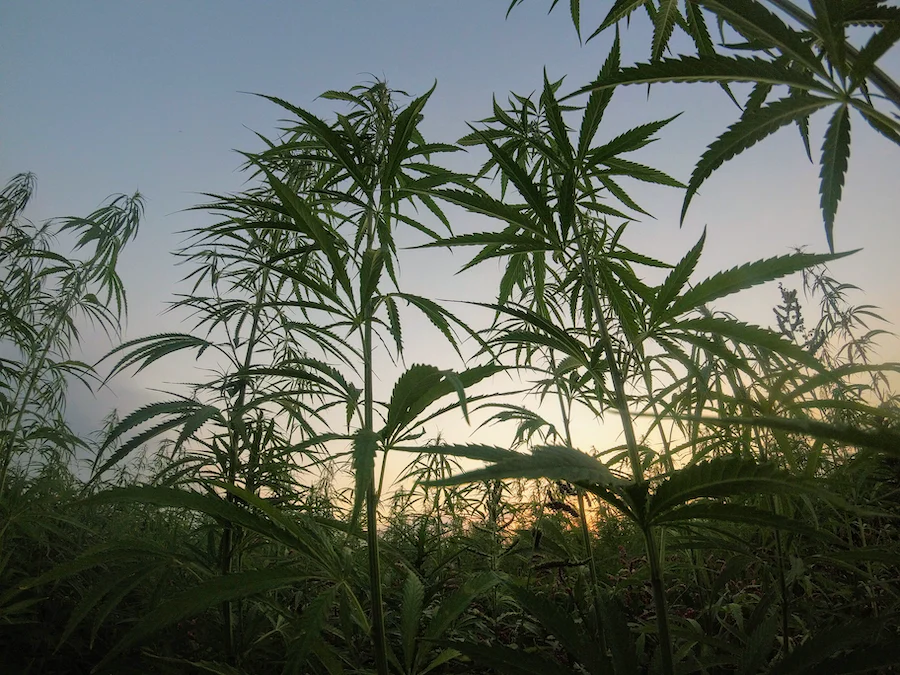
Consumption and Effects
THCA is primarily found in raw, unheated cannabis plants, especially in fresh flowers or leaves. It's commonly consumed through raw cannabis consumption, such as adding fresh leaves to smoothies or juices.
However, THCA can also be found in products that haven't undergone heating processes, like tinctures or topicals, preserving its non-psychoactive nature.
Does THCA Get You High?
In its raw state, THCA doesn't induce a "high" or psychoactive effects, contrary to THC. However, when heated—such as through smoking, vaporizing, or cooking—THCA can decarboxylate into THC, leading to psychoactive effects.
The decarboxylation process involves the removal of a carboxylic acid group, converting THCA into THC and making it psychoactive.
How THCA Becomes THC
Smoking or heating raw cannabis buds or concentrates containing THCA is a common way to convert it into THC.
This conversion occurs when the heat from smoking or vaporizing causes decarboxylation, changing THCA into psychoactive THC. Cooking or baking cannabis-infused foods can also lead to decarboxylation, activating THCA into THC, resulting in the typical euphoric effects associated with THC consumption.
THCA in Drug Tests
THCA itself doesn't typically show up on standard drug tests because these tests primarily aim to detect THC, the psychoactive component.
However, some specialized tests can distinguish between THCA and THC. In cases where advanced testing is performed or in specific contexts, the presence of THCA might be identified.
The method of consumption plays a crucial role in THCA detection. For instance, if the consumption involves raw or unheated cannabis products, THCA is less likely to be detected as THC.
Additionally, individual metabolism, dosage, and frequency of use can impact how long THCA or its metabolites stay in the system, potentially influencing detectability in drug tests.
While THCA doesn't usually result in a positive drug test for THC, individuals subject to drug testing should consider the possibility of specialized tests or the potential conversion of THCA into detectable THC under certain conditions.
Legal Status
In the United States, THCA is federally legal under the Farm Bill of 2018. This piece of legislation states that hemp and hemp derivatives, including cannabinoid compounds like THCA, are legal, but this bill also embodies much more than that.
The distinction between what cannabis plants qualify as hemp or marijuana comes down to their THC contents. Cannabis plants containing 0.3% THC or less on a dry-weight basis legally constitute hemp, and cannabis plants surpassing that threshold are considered marijuana.
The loophole? THCA becomes THC once heated, yes, but in its raw form, THCA is non-psychoactive and not considered THC, so even cannabis plants with higher THCA concentrations are legally seen as hemp!
This means that while you can technically get lots (and we do mean lots) of THC from heating up THCA naturally found in hemp plants, this compound is 100% legal to use, sell, and buy at the federal level.
That being said, individual states do have their own restrictions and laws concerning hemp products, so if you’re looking for a THCA fixing, be sure to check your state laws beforehand.
Reputable sources, such as ourselves here at Chill Clouds, don't ever ship to states where cannabinoids are not considered legal, and if you live in a state where hemp-derived cannabinoids are unlawful and see an online seller willing to ship to you, run for the hills! You don't want to buy anything from sellers that have no regard for regulations.
THCA in Cannabis Products
A high THCA percentage in cannabis products signifies a significant concentration of tetrahydrocannabinolic acid. It implies a potential abundance of raw THCA before it converts into THC through decarboxylation, a process triggered by heat.
Products with higher THCA levels may offer stronger potential when converted to THC, resulting in more potent psychoactive effects upon consumption.
THCA in Different Cannabis Products
Understanding THCA levels in different cannabis products provides insight into their potential psychoactive effects upon activation or consumption. Consumers should consider the THCA content to gauge the potential strength and effects of the product when converted to THC.
|
Cannabis Product |
THCA Percentage |
Description |
|---|---|---|
|
High |
Represents THCA in cannabis buds |
|
|
THCA Diamonds |
Very High |
Concentrated crystalline THCA form |
|
THCA Edibles |
Moderate |
Contains THCA not exposed to heat |
|
THCA Concentrates |
Variable |
May contain varying THCA levels based on processing methods |
|
THCA Tinctures |
Low |
Typically lower THCA content in liquid form |
Production of THCA Products
THCA flower is derived from the cannabis plant. The key process involves harvesting and drying cannabis flower buds. These buds naturally contain THCA in its acidic form, which isn't psychoactive until heated or decarboxylated.
Cultivators and producers usually aim to preserve THCA content during the drying process to prevent the conversion into THC. The flower is carefully cured to maintain the unactivated THCA.
The process of spraying THCA flower involves coating cannabis buds with a concentrated THCA solution or isolate to increase the overall THCA content. However, this practice is not commonly found in regulated markets or within reputable dispensaries.
This is because spraying flower artificially manipulates the cannabinoid profile, and such manipulation isn't typically necessary as the unactivated THCA already exists naturally within the plant. Spraying could potentially lead to inconsistencies and raise concerns about product quality and safety.
Reputable manufacturers and cultivators prioritize natural processes to retain the plant's inherent THCA content without external manipulations.
This method is not a common or accepted practice in the cannabis industry's regulated sectors, as it might compromise the product quality and integrity. Instead, producers focus on natural cultivation methods to maximize the natural THCA content within the flower.
Safety and Risks
In its raw form, THCA is non-psychoactive, meaning it doesn't induce the typical "high" associated with THC. When heated or decarboxylated through processes like smoking or vaporization, THCA is converted to THC, which elicits psychoactive effects.
However, on its own, THCA does not produce intoxicating effects.
THCA is considered safe for consumption. As it doesn't cause psychoactive effects in its raw state, it's commonly found in various raw cannabis products like juices or teas. In this form, THCA is associated with potential health benefits without the risk of intoxication.
Though generally well-tolerated, individual reactions to THCA consumption may vary. Some individuals might experience side effects such as nausea or allergic reactions, albeit rare.
Additionally, for individuals undergoing specific medical treatments or using certain medications, consuming THCA-rich products might not be advisable.
As with any substance, it's recommended to consult a healthcare professional before incorporating THCA products, especially for those with pre-existing health conditions or individuals using medication that might interact with cannabinoids.

Persistence in the Body
The duration THCA stays in the body can vary based on several factors. Typically, it isn't directly tested for in most drug screenings because it's non-psychoactive and doesn't pose a threat. Upon ingestion, THCA can convert to THC and might be detected indirectly through THC screenings.
Its presence might be detected for varying durations, but it generally tends to be shorter than THC due to its non-psychoactive nature.
Factors influencing the duration of THCA in the body include the consumption method, individual metabolism, and the sensitivity of the drug test.
The way THCA is consumed impacts its presence; for instance, consuming raw cannabis containing THCA might result in a quicker elimination compared to heated or vaporized forms that are converted into THC.
Individual metabolic rates play a role; those with faster metabolism might clear THCA from their system more rapidly.
Lastly, drug tests' sensitivity levels influence detection; some tests might be more sensitive and capable of identifying lower levels of cannabinoids, while others may only detect higher concentrations, affecting the duration THCA remains detectable in the body.
Distinct Paths: Contrasting THCA and Delta-8 for Cannabis Applications
THCA and delta 8 are distinct cannabinoids within the cannabis family, each offering unique characteristics and potential benefits.
THCA, as a non-psychoactive precursor to THC, holds promise in therapeutic applications, showcasing anti-inflammatory and neuroprotective properties. Conversely, delta 8, with its mild psychoactive effects, offers potential for anxiety relief and appetite stimulation, albeit with varying degrees of potency.
That said, THCA becomes THC when decarboxylated, meaning it becomes twice as strong as delta 8 when smoked or vaped.
Understanding the differences between THCA and delta 8 is essential, but frankly, there’s no wrong choice. It all depends on what kind of effects you’re looking for. For no psychoactive effects, go for raw THCA; for a mild buzz, go for delta 8; and for a more intense, old-school weed experience, decarboxylated THCA’s your guy.

